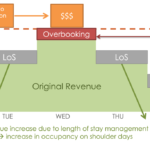Blog

First, let us be clear on what we understand to be our market…
A market is composed of actual or potential customers with certain characteristics that could lead them to become your guests, such as the authority to buy, the willingness to buy; buying power (or, the ability to buy), and of course a reason to buy, some unmet need or want, that your product could meet.
Market segmentation is a marketing strategy that involves dividing a broad target market into subsets of consumers who have common needs and priorities, and then designing and implementing strategies to target them.
Now, this market is not uniform in either behavior or requirements. Thus, you can segment your market by grouping your customers based on their needs and create sub-groups.
Basically, you segment the pie that is your customer base into smaller slices that are each a sub-group. The way we do this is by grouping customers with similar needs and other variables into one segment so that this segmented market can be more accurately targeted and reached with a distinct marketing mix. In other words, not only do we divide this pie, but we divide it based on need, whenever we see a group of people with needs different from others so that we can reach out to them specifically.
Every day, many travelers arrive in your city. Obviously, not all of them can be accommodated in your hotel, so your goal is not to serve the entire market but to target specifically those people whose business you really want. Market segmentation helps you identify and focus on those people.
How your customers behavior can be important to the effective segmentation of your market and where does the information on these behaviors come from?
What kind of information do you currently track in your organization that would provide you with data about your customer’s behavior?
Some of the common behavioral variables tracked in every hotel would be the unit and product types, rates, occupancies, lengths of stay, additional spending, marketing channels, favored days of the week, frequency of purchase and of course, the revenue. This data can be collected from Property Management Systems and other data system at your hotel.
What are the Consequences of poor tracking?
Hotels that are less knowledgeable about its markets and segment of customers often mix up the sources, channels and the mode reservations, various other parameters, etc., while recording the transactions. While the hotels use the market segments field to fulfil their wish list of generating their own reports, what are the key consequences of that are faced;
If the data we receive from all the channels is not accurate, this can lead to a series of problems, starting with poor forecasting. Inaccurate forecasts can result in inventory and pricing decisions with unachievable budgets, which can then lead to incorrectly targeted strategies and wasted advertising and marketing efforts.
What are the key criteria that helps to identify segments?
Identifiable – must be able to say with certainty that a reservation falls into a certain segment
Accessible – no good creating segments for markets or behaviours that we can never reach or have in our hotels
Substantial – segments must be of sufficient size
Responsive – segments must be able to react to changes/activities we undertake (for example, change in price or a marketing campaign)
OK, now let’s look in more detail at the process of segmenting a market. What’s the reason we group some people in one segment and others into another one?
One way to check the viability of a market segment is to ask whether the customers in that segment are homogeneous and self-referencing (i.e. do they talk to each other, read the same publications, attend the same conferences, belong to the same professional associations, shop in the same places etc.). Self-referencing groups of customers should be relatively easily and cost-effectively reached by a single marketing mix.
In the real world, we segment markets in one of four ways:
a) demographic (i.e. according to age, sex, religion, race, income, nationality, occupation etc)
b) Psychographic – according to their interests, attitudes, opinions, and needs.
c) Geographic – according to their region, country size, density, climate.
d) Behavioural – according to their occasion, benefits, usage rate, readiness to buy, attitude towards the product, loyalty status.
If you talk to your Branding Manager or to PR executives, demographic and psychographic segmentation is probably the kind they use the most often. They track the customer by the demographic levels and also the psychology of his behavior so they can create the product that best fits the target segment. However, it is very difficult for us to collect demographic and psychographic information from ordinary operations and interactions with our customers
So, we tend to use Geography and more often customer Behavior to segment our market because this is the data we can collect. However, geographic location, doesn’t provide enough information to allow you to segment your market in a usable way. This leaves customer behavior as the best tool for market segmentation.
Way forward:
When we analyze the behavior of any segment, we try to understand the behavior of each with the aim of developing a more effective marketing strategy for it. In this context there are three important things that we need to note:
Why are they here?
Why is your customer at your hotel?
Is it for business or leisure, for family or socializing or perhaps they are here just because your marketing team has done such a great job on the branding?
What are they looking for?
Are they looking for quality, competitive pricing, ambience, flexibility etc?
And lastly, note their Product Usage – Are they brand loyal or do they tend to switch between brands?
Are they returning guests or are they first timers? What do they spend on while they are in your hotel and how often? Do they welcome your product offerings? How loyal are they to your brand?
All of this will help you form a good behavior analysis that will enable the Revenue Manager to build a right marketing strategy and form the correct Revenue Management program targeting your market segments.
Who is responsible for this?
Accurate market segmentation is critical to a Revenue Manager’s work. It is therefore also critical that the data used to define and maintain this market segmentation is properly tracked and is accurate.
Accurate and consistent tracking is a team effort spearheaded by the Revenue Manager but begins with the proper setup of the Property Management System and continues with the quality of information entered into the PMS. All departments involved in the Revenue Management process should be trained to accurately enter reservations, arrivals and other data that helps to manage your market segments.
So, let’s review the key points about marketing segmentation. First, segmenting and focusing on specific sub-groups of all potential customers lets a hotel market, price and operate more effectively. Not all possible market segments are of equal value, and there are criteria that help you decide which segments are most important to you.
Benefits:
Now, market segmentation comes with its own benefits.
Among the benefits of correct segmentation are accurate forecasting that helps to create market mix optimization, more effective and targeted pricing strategies, and greater operational efficiencies. Put these together and they mean your hotel is much more focused on the specific customers you best serve – and this translates into more success for your hotel.
– Accurate forecasting
– Market mix optimization
– More effective and targeted pricing strategies
– Operational efficiency
Let’s start by talking about how to go about segmenting your market. Bring in the Experts. Get RevOpt.
Subscribe & Follow
Recent Tweets
Recent Posts
-

Unlocking Profitability Through Revolutionary Revenue Management: A…
December 15, 2023 -

Why is it important to segment your…
November 30, 2023 -

Full pattern Length of Stay controls increase…
September 26, 2023 -

Achieving the Right Mix of Strategic &…
January 11, 2019 -

Better Budgeting Through Revenue Management
December 21, 2018
Facebook Posts
getRevOpt
Go beyond organic to Expenential Growth
BRING IN THE EXPERTSWhat makes Revopt Unique?
Our unparalleled services helps hotels, chains and management companies develop collective
knowledge of revenue management and upskill their teams to drive exponential revenue.
-
Exponential Revenue
GrowthRevOpt helps you to go beyond organic to Exponential Growth by unlocking the true revenue potential to achieve optimal performance.
-
Automated Revenue
Management SystemCustom tailored to your exact needs. Increased revenues 6%-18%. Multiply profits in as little as 15 minutes per day. Outperform competitiors by 36% or more.
-
Long-term Profitability
& Asset ValueTailor made revenue optimization solution to create a sustainable growth strategy to increase profitability & long-term asset value.
-
Expertise with
unparallelled ServicesRevOpt best industry practices, proven techniques, latest trends & strategies that help hotels to challenge the status quo & outperform the competitors.
